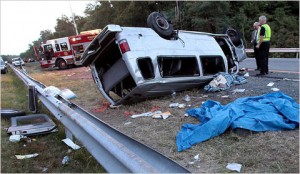 Every case has two parts: liability and damages. And, to win your case before a jury, you have to prove both by the greater weight of the evidence. In fact, if you cannot show liability, the jury does not even consider damages. Your Miami Car Accident Lawyer explains:
Every case has two parts: liability and damages. And, to win your case before a jury, you have to prove both by the greater weight of the evidence. In fact, if you cannot show liability, the jury does not even consider damages. Your Miami Car Accident Lawyer explains:
The practical impact of this is that, if a case is being negotiated before a lawsuit has been filed, an adjuster will look to both parts in order to evaluate it. Likewise, if a case has been filed at the courthouse, the lawyer for the defendant will evaluate both liability and damages in order to report to his client what he, she, or it is facing.
Now, in a car accident case, rear end collisions are usually the fault of the rear-vehicle. In fact, once a case gets to trial, there is what is called a “rebuttable presumption” that the person who did the rear-ending in the car accident is at fault, or wrong. This means that the person who rear-ended you is presumed to be in the wrong. He or she can “rebut” or refute that presumption by showing one of four things. To avoid getting a directed verdict at trial on whose fault the accident was, the defendant would have to show (1) that there was something mechanically wrong with his or her car; (2) that the lead driver made a sudden stop; (3) the lead driver made a sudden lane change; or (4) that the lead driver made an illegal or improper stop. Dept. Highway Safety v. Saleme, 963 So. 2d 969 (Fla. 3rd DCA 2007). With regard to the sudden stop exception, a sudden stop, alone, is insufficient. Clampit v. Spencer, 786 So. 2d 570 (Fla. 2001). Rather, for this exception to kick in, “the lead driver’s stop must occur “at a time and place where it could not reasonably be expected by the following driver”. Pierce v. Progressive, 582 So. 2d 712 (Fla. 5th DCA 1991).

 Miami Personal Injury Attorney Blog
Miami Personal Injury Attorney Blog


